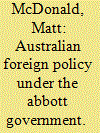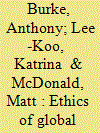|
|
|
Sort Order |
|
|
|
Items / Page
|
|
|
|
|
|
|
| Srl | Item |
| 1 |
ID:
142226


|
|
|
|
|
| Summary/Abstract |
While foreign policy featured prominently on the Australian political agenda in late 2014, the manner of Australia's engagement with the world challenges the idea of a ‘pivot’ from domestic politics to foreign policy. In particular, the government demonstrated a tendency to prioritise domestic political considerations, in particular public opinion, in its dealings with the outside world. This was evident across a range of issue areas: from the ‘internationalist’ agenda of asylum, climate change and aid to more traditional concerns such as bilateral relations with Indonesia and international security. This article explores these dynamics and asks what implications this has for both Australian foreign policy and theoretical accounts of the role and desirability of public engagement with foreign policy in international relations thought.
|
|
|
|
|
|
|
|
|
|
|
|
|
|
|
|
| 2 |
ID:
061928


|
|
|
| 3 |
ID:
066629


|
|
|
| 4 |
ID:
071466


|
|
|
|
|
| Publication |
2006.
|
| Summary/Abstract |
From 2001, the Australian government has justified a hard-line approach to asylum-seekers on the basis of the need to preserve its sovereignty. This article critically evaluates this justification, arguing that the conception of sovereignty as the 'right to exclude' involves a denial of responsibility to the most vulnerable in global politics. We particularly focus here on the ways in which the Australian government has attempted to create support for this conception of sovereignty and ethical responsibility at the domestic level, through marginalising alternative voices and emphasising the 'otherness' of asylum-seekers and refugees. We conclude by suggesting what this might mean for the treatment of asylum-seekers in global politics and for statist approaches to global ethics.
|
|
|
|
|
|
|
|
|
|
|
|
|
|
|
|
| 5 |
ID:
145151


|
|
|
|
|
| Summary/Abstract |
The security agenda is going global. Key threats such as weapons proliferation, disease, terrorism and climate change cannot be addressed unilaterally by states, and require a global perspective to both understand and respond effectively to them. There are therefore powerful pragmatic reasons for embracing a global security perspective. This article, however, suggests that a compelling moral case also exists for viewing security in global terms. National and international security discourses are at odds with the realities of world politics and orient towards the preservation of a status quo that is failing much of the world's population, now and into the future. In this context, this article makes a case for cosmopolitan ethical principles underpinning a global security perspective. Only an ethics that does not discriminate between groups is defensible as a general set of principles. A global security perspective should be underpinned by three cosmopolitan ethical principles which dictate, firstly, that all security actors have responsibility (albeit differentiated) to create security for all; secondly, they should act with consideration of the future implications of their actions in mind; and, thirdly, they should proceed as if their actions will become global over time and space. While not without challenges and dilemmas, such a perspective is urgently needed in contemporary global politics.
|
|
|
|
|
|
|
|
|
|
|
|
|
|
|
|
| 6 |
ID:
094043


|
|
|
|
|
| Publication |
2010.
|
| Summary/Abstract |
While a range of accounts have engaged with the important question of why Australia participated in military intervention in Iraq, few analyses have addressed the crucial question of how this participation was possible. Employing critical constructivist insights regarding security as a site of contestation and negotiation, this article focuses on the ways in which the Howard Government was able to legitimise Australian involvement in war in Iraq without a significant loss of political legitimacy. We argue that Howard was able to 'win' the 'war of position' over Iraq through persuasively linking intervention to resonant Australian values, and through marginalising alternatives to war and the actors articulating them.
|
|
|
|
|
|
|
|
|
|
|
|
|
|
|
|
| 7 |
ID:
191748


|
|
|
|
|
| Summary/Abstract |
The security implications of climate change are increasingly acknowledged in academic scholarship and in national security strategy documents. Climate change has also increasingly featured in UN Security Council (UNSC) debates since the first discussion of this topic in 2007. However, the UNSC has yet to agree a resolution formally recognizing its own role in addressing the implications of climate change for international security; a draft resolution on this issue was voted down in late 2021. Examining the statements and contours of 2021 debates preceding this vote, this article points to fundamental impediments to such a resolution, with the position of opponents (Russia, China and India) suggesting intractable obstacles linked to different visions of world order. While opponents' stated concerns about the UNSC's role in addressing climate change find some support in existing scholarship, the authenticity of claims made by opponents is called into question by the internal inconsistency of these arguments, the gap between stated concerns and foreign policy in other contexts, and the broader foreign policy interests and identities of these states. These factors present key impediments not simply to a UNSC resolution, but arguably to international action consistent with the urgency of the climate crisis.
|
|
|
|
|
|
|
|
|
|
|
|
|
|
|
|
| 8 |
ID:
099500


|
|
|
|
|
| Publication |
2010.
|
| Summary/Abstract |
In justifying participation in military intervention in Afghanistan and Iraq as part of the "war on terror," Australian Prime Minister John Howard invoked the memory of Australian sacrifice in war, linked most prominently to the so-called "Anzac myth." This paper explores the role of memory politics in enabling military intervention, discussing in the process the relationship between sites and forms of remembrance and broader discourses of national identity. This use of collective memory has significant implications for debates about Australian identity, and suggests the need for approaches to the study of international relations to take seriously the role of memory politics in coming to terms with conditions of possibility for particular security policies and practices.
|
|
|
|
|
|
|
|
|
|
|
|
|
|
|
|
| 9 |
ID:
062340


|
|
|
| 10 |
ID:
149900


|
|
|
|
|
| Summary/Abstract |
Political challenges are arguably the biggest constraint to the realization of regional energy projects in South Asia, an issue that has impeded cooperation despite the existence of substantial economic incentives. Although challenges such as technical difficulties, financial constraints and bureaucratic inefficiency are important, they are essentially subsidiary issues, the solutions to which are held hostage by often mentioned but rarely examined political impediments. While existing accounts of political obstacles in contemporary literature are relatively abstract, this paper draws on interviews with government officials, academics, representatives of regional institutions and officials of multilateral development banks in Bangladesh, Nepal, Pakistan and India to get insights into their experience of possibilities for and limitations to energy cooperation. By synthesizing the findings of interviews with relevant literature, this paper undertakes a systematic analysis of the political challenges to regional energy projects and provides a number of policy recommendations to overcome these impediments.
|
|
|
|
|
|
|
|
|
|
|
|
|
|
|
|
| 11 |
ID:
085397


|
|
|
|
|
| Publication |
2008.
|
| Summary/Abstract |
Those interested in the construction of security in contemporary international politics have increasingly turned to the conceptual framework of `securitization'. This article argues that while an important and innovative contribution, the securitization framework is problematically narrow in three senses. First, the form of act constructing security is defined narrowly, with the focus on the speech of dominant actors. Second, the context of the act is defined narrowly, with the focus only on the moment of intervention. Finally, the framework of securitization is narrow in the sense that the nature of the act is defined solely in terms of the designation of threats. In outlining this critique, the article points to possibilities for developing the framework further as well as for the need for those applying it to recognize both limits of their claims and the normative implications of their analysis. I conclude by pointing to how the framework might fit within a research agenda concerned with the broader construction of security.
|
|
|
|
|
|
|
|
|
|
|
|
|
|
|
|
| 12 |
ID:
170407


|
|
|
|
|
| Summary/Abstract |
In the current higher education context there are strong incentives for the development of work-ready skills for graduates. In this article, I reflect on the challenges of mediating between developing vocational skills and emphasising the immediate practical and policy relevance of coursework on one hand, and the development of critical thinking and research skills on the other, in the context of teaching Australian Foreign Policy.
|
|
|
|
|
|
|
|
|
|
|
|
|
|
|
|
| 13 |
ID:
153111


|
|
|
|
|
| Summary/Abstract |
The last decade in Indonesia has seen the emergence of localized militia groups. In Bali, these groups are now particularly prolific. Conventional wisdom in international relations thought is that these organizations constitute a threat to the authority of the state (its monopoly on the legitimate use of force) and may require national security measures to deal with them. Yet these organizations ultimately define their own role in terms of the provision of security, claiming that they act to preserve or advance core values of their communities. In this sense, their security role with reference to the state is ambiguous: they often enjoy legitimacy at the local level and perform important security functions for their local communities, even while constituting an alternative site of security practice and challenging the (exclusive) security role of the Indonesian state. Drawing on ethnographic research, this article examines these actors as security agents and employs a framework of security contestation to make sense of the manner in which they engage with and redefine the provision of security in Bali. In this context, the emergence and practices of Balinese militia groups challenge the way we view non-state actors in the security space and, more generally, the way we conceive security agency in international relations.
|
|
|
|
|
|
|
|
|
|
|
|
|
|
|
|
|
|
|
|
|